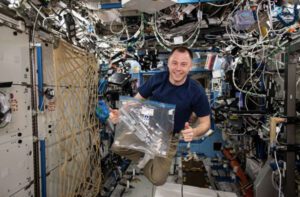The International Space Station (ISS) National Laboratory is soliciting proposals to leverage the orbiting outpost for education programs and training for space-focused careers.
This ISS National Lab Research Announcement (NLRA) is open to U.S.-based institutions (academic, commercial, government, or not-for-profit) with a vested interest in workforce development and science, technology, engineering, and mathematics (STEM) education. The solicitation has up to $350,000 in total funding available, with the expectation to award up to three projects.
 Proposals must seek to create or expand education programs, projects, or public-private partnerships that leverage the space station or space-based research to:
Proposals must seek to create or expand education programs, projects, or public-private partnerships that leverage the space station or space-based research to:
- Engage post-secondary students (including colleges, universities, community or junior colleges, and vocational institutions)
- Enhance K-12 learning
- Provide professional development experiences for formal and informal educators
Proposals for flight projects must include a statement defining how the concept will engage and prepare students for STEM careers.
For example, a project awarded through a prior education-focused NLRA, Tomatosphere™, is a free, curriculum-driven program that allows K-12 students to investigate how the space environment affects tomato seed germination and growth. Educators in the U.S. and Canada can register to receive tomato seeds that flew on the space station. More than 3 million students in more than 24,000 classrooms in North America have participated in Tomatosphere since 2001. Through the program, students learn about crops and food produced from seeds and gain a newfound awareness and interest in career possibilities in space.
A new, college-level program recently awarded through a STEM NLRA is designed to introduce Ph.D. and M.D. students at the Cleveland Clinic to space medicine. The week-long course, lab practical, and simulated-space-environment experiment is focused on orthostatic hypotension (a condition that causes a sudden drop in blood pressure when a person stands), which affects both astronauts and people on Earth. Through these activities, the program aims to strengthen students’ knowledge of empirical lab methodology.
This research announcement will follow a two-step proposal submission process. Before being invited to submit a full proposal, all interested investigators must first submit a Step 1: Concept Summary for review. Step 1: Concept Summaries must be submitted by end of day on March 26, 2025. Step 2: Full Proposals (from those invited to submit) will be due by end of day June 2, 2025.
To learn more about this opportunity, including how to submit a Step 1: Concept Summary, visit the research announcement webpage. Check online to learn more about the ISS National Lab and the science that it sponsors.
PHOTO: NASA astronaut Nick Hague is photographed with the CASIS PCG-14 investigation in the Destiny module of the International Space Station (ISS). The Wisconsin Crystal Growing Contest-Wisconsin Space Crystals (CASIS PCG 14) teaches middle and high school students the unique engineering research and operations of the space program. The investigation allows students to understand the capabilities and constraints of conducting an experiment in microgravity. (Image credit: NASA)



